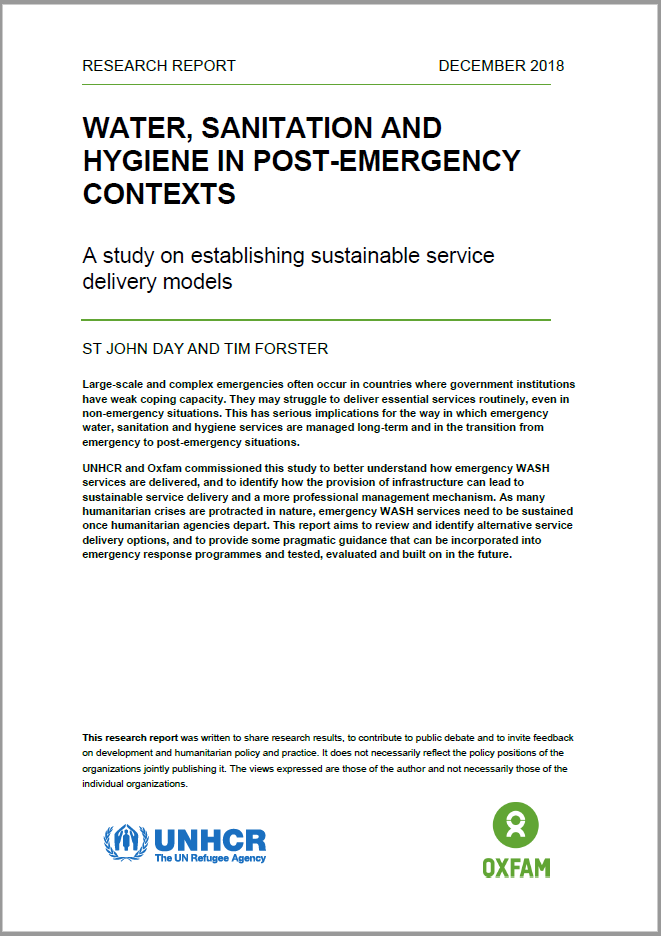 |
The Cost of Water ProjectThe Cost of Water Project supports the effective planning and sustainable management of water supply systems in refugee camps and settlements. Launched in 2014 by the Water, Sanitation and Hygiene (WASH) Unit in DPSM’s Public Health Section in partnership with the International Water and Sanitation Centre, the project measures the overall costs of providing effective water systems in a variety of refugee hosting contexts to create a flexible decision-making tool specific to refugee situations.
|
 |
UNHCR WASH Flyer 2019Brief WASH Flyer illustrating the global challenges delivering WASH services for refugees. The flyer touches on UNHCR’s WASH response to the 2030 agenda and the human right to safe water and sanitation. |
 |
Water, Sanitation and Hygiene in Post-Emergency Contexts (UNHCR, OXFAM GB)UNHCR and Oxfam commissioned this study to better understand how emergency WASH services are delivered, and to identify how the provision of infrastructure can lead to sustainable service delivery and a more professional management mechanism. As many humanitarian crises are protracted in nature, emergency WASH services need to be sustained once humanitarian agencies depart. This report aims to review and identify alternative service delivery options, and to provide some pragmatic guidance that can be incorporated into emergency response programmes and tested, evaluated and built on in the future.
|
 |
WASH for children in emergenciesGuidance on considering the needs of children in planning and implementing WASH services in emergencies. |
 |
Oxfam research report: community Engagement in WASH Service Delivery in Zaatari campThis study was commissioned by Oxfam in Jordan to map and analyse the perspectives of different stakeholders within the refugee population in Zaatari camp, as well as those within relevant organisations, regarding community engagement in WaSH services, and provide recommendations on this.
|
 |
WASH Accountability Resources – Ask, Listen, CommunicateThis booklet contains material and resources to promote forward accountability in WASH programmes.
|
 |
MHM in Emergencies Toolkit – Mini Guide – Arabic VersionThis adjoining document provides a brief summary of the key actions necessary for addressing MHM during emergencies. It serves as a quick read to gain a basic understanding of a complete MHM response. However, it is advised to review the complete guide when designing programs or developing response activities.
|
 |
Large Ferro-Cement Water Tank Design Parameters and Construction Details (UNHCR, 2006)This document contains guidance, material specifications, bills of quantitiy, technical design drawings, and step-by-step constuction photos for three large 45m3, 70m3 and 90m3 circular water reservoirs constructed from ferrocement.
|
 |
How to Support Survivors of GBV When a GBV Actor is Not Available in Your Area (IASC, 2015)The “Pocket Guide” resource package V2.0 is a joint GBV Guidelines and GBV AoR resource designed to provide all humanitarian practitioners with concrete information on how to support a survivor of gender-based violence who disclosed to you in a context where there is no gender-based violence actor (including a referral pathway or GBV focal point) available in your area. The resource package uses global standards on providing basic support and information to survivors of GBV without doing further harm. We encourage adaptation of this resource to your local context with the support of a GBV specialist.
|
